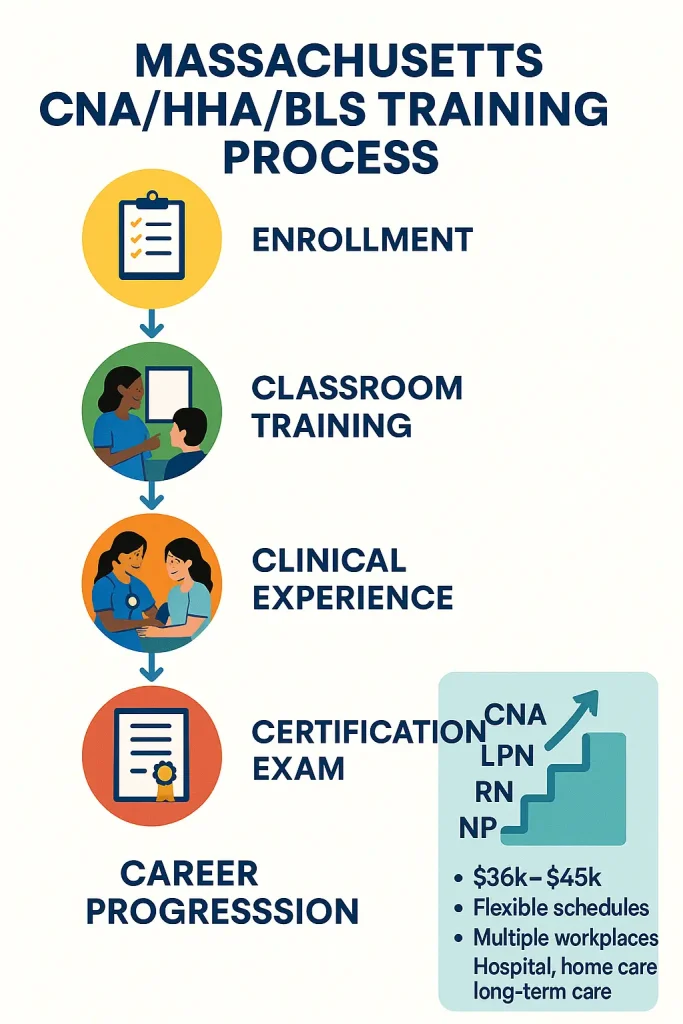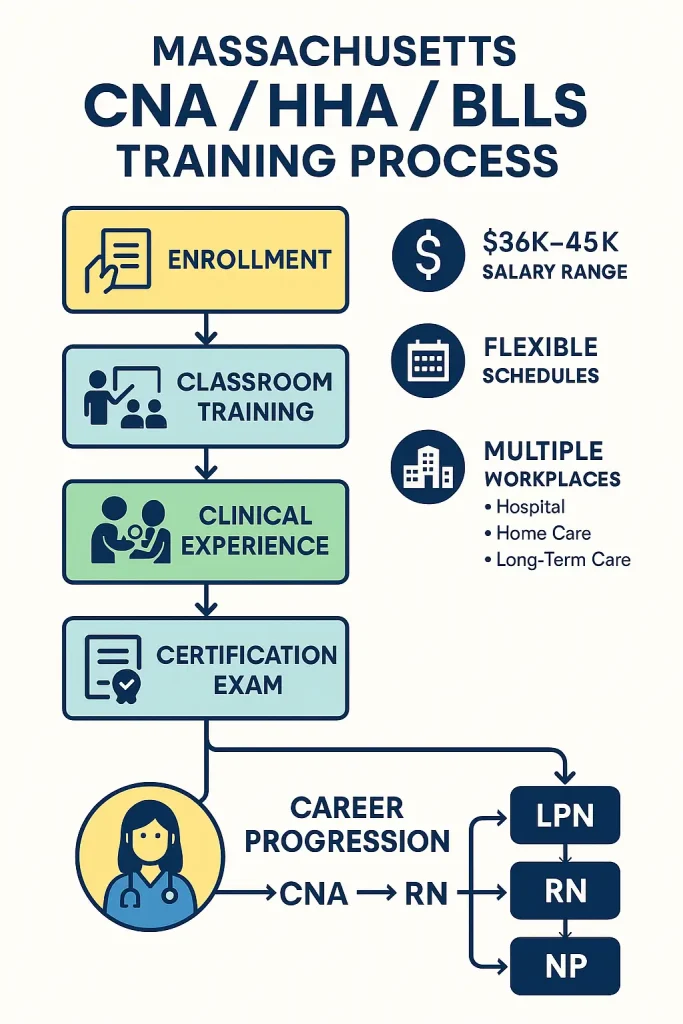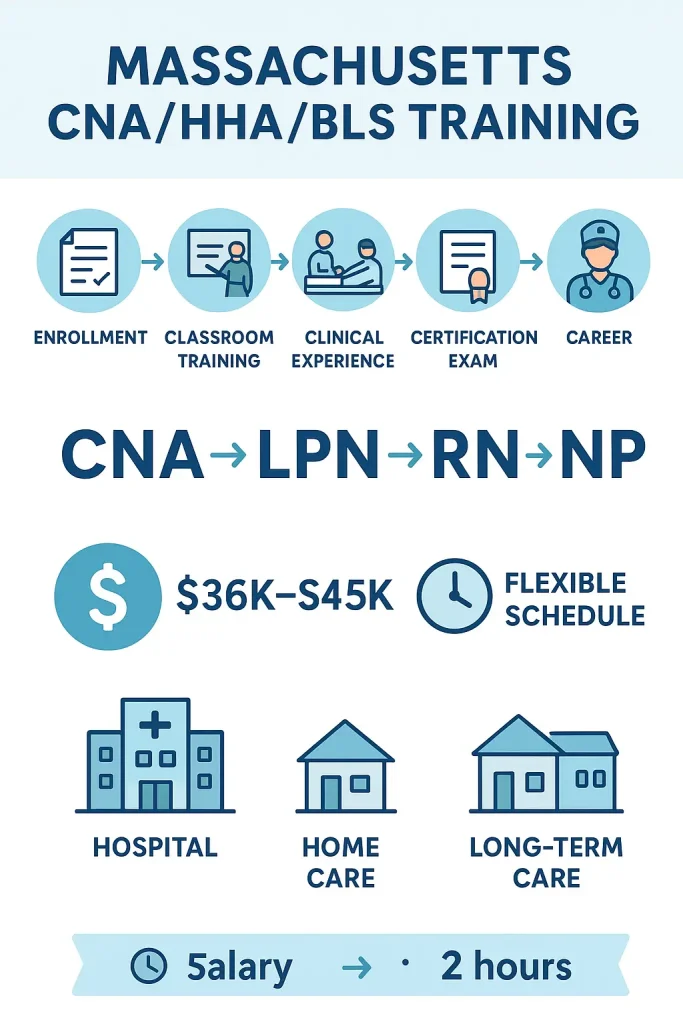Why Become a CNA or HHA in Massachusetts
Massachusetts me Certified Nursing Assistant (CNA) aur Home Health Aide (HHA) ki demand rapidly grow kar rahi hai due to aging population aur healthcare needs.
Benefits of Becoming a CNA/HHA:
- Growing Demand: Hospitals, long-term care facilities, and home care agencies constantly need skilled caregivers.
- Rewarding Career: Direct patient care provides meaningful interactions and emotional fulfillment.
- Job Stability: Multiple workplace options including hospitals, nursing homes, hospice care, and private homes.
- Flexible Schedules: Full-time, part-time, evening, and weekend options.
- Emotional & Soft Skills Growth: Develop empathy, communication, teamwork, and interpersonal skills.
- Professional Satisfaction: Real impact stories of CNAs/HHA in patient lives inspire career growth and personal fulfillment.
Section 2: CNA & HHA Certification Requirements
To become certified in Massachusetts, a few requirements must be met:
- Minimum age 18 or high school diploma/GED
- Completion of a state-approved CNA/HHA training program (classroom + clinical experience)
- Pass state exam (written + skills demonstration)
- Criminal background check & health screening
- Continuing education & license renewal to maintain active status

Training Program Options
One Health and Beyond offers multiple training formats:
- Standard Programs: 8–12 weeks, classroom + hands-on clinical
- Fast-track Programs: 4–6 weeks, accelerated learning
- Hybrid/Online Programs: Virtual lectures with practical labs for flexible learning
- Employer-Sponsored / Paid Training Programs: Get trained while earning
Choosing the Right Program
When selecting a program, consider:
- Accreditation & State Approval: Ensure program is officially recognized.
- Instructor Experience & Clinical Sites Quality
- Program Length, Cost, Location, Schedule
- Student Support & Job Placement Services

Career Path & Opportunities
CNA/HHA careers offer a clear advancement path:
- CNA → LPN/LVN → RN → Advanced Practice (NP/FNP/DNP)
- Specialized roles in geriatrics, pediatrics, hospice, and home health
- Soft Skills & Workplace Readiness are crucial for career progression
- Continuing education opens doors for promotions and higher certifications
Salary & Job Outlook in Massachusetts
Massachusetts me healthcare assistant ki salary aur job outlook promising hai:
- Average Hourly Wage: $18–$22
- Annual Salary: $36,000–$45,000
- Overtime & Shift Differentials
- Job Growth & Demand Projection: Healthcare support roles expected to grow steadily over next decade
Enrollment Process & Tips
Step-by-Step Enrollment Guide:
- Choose your desired program (CNA, HHA, or BLS)
- Prepare required documents: ID, high school diploma/GED, health records
- Submit application online or in-person
- Pay fees and schedule orientation
- Attend training and complete clinical hours
- Pass state exam
- Receive certification and begin career
Contact One Health and Beyond for guidance, enrollment assistance, and program availability.
FAQs
Q1: How long does it take to complete CNA/HHA/BLS training?
A: The duration varies depending on the program you choose. Most CNA, HHA, and BLS training programs in Massachusetts can be completed in 4–12 weeks. Some intensive programs may be shorter, while part-time options may take a bit longer.
Q2: Can I work while studying?
A: Yes! Many programs offer part-time schedules or flexible class timings, allowing you to work while completing your training. Evening or weekend classes are often available to accommodate working students.
Q3: Is financial aid available?
A: Yes, financial assistance may be available depending on the program and your eligibility. Check the specific program details for scholarships, grants, or payment plans to help cover tuition costs.
Q4: How to renew a CNA/HHA license in Massachusetts?
A: License renewal requires continuing education and completing the state renewal process. Make sure to track your hours, meet the renewal deadlines, and submit any required forms to the Massachusetts Department of Public Health.
Q5: What is the difference between a CNA and an HHA?
A:
- CNA (Certified Nursing Assistant): Primarily works in healthcare facilities such as hospitals, nursing homes, or clinics, assisting patients with daily activities like bathing, dressing, and vital signs monitoring.
- HHA (Home Health Aide): Provides in-home care, focusing on personal assistance, companionship, and supporting patients with their daily living activities in their own homes. HHAs often have a more personal and one-on-one caregiving role.






